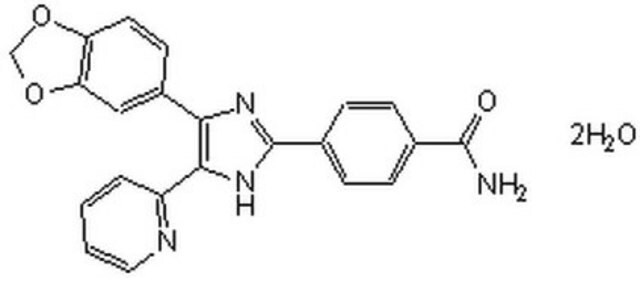おすすめの製品
品質水準
アッセイ
≥98% (HPLC)
形状
powder
色
off-white to tan
溶解性
DMSO: >5 mg/mL
保管温度
2-8°C
SMILES記法
Fc1ccc(Cl)cc1-c2nc(Nc3ccncc3)c4nccnc4n2
InChI
1S/C17H10ClFN6/c18-10-1-2-13(19)12(9-10)15-24-16-14(21-7-8-22-16)17(25-15)23-11-3-5-20-6-4-11/h1-9H,(H,20,22,23,24,25)
InChI Key
BERLXWPRSBJFHO-UHFFFAOYSA-N
アプリケーション
SD-208 was used to inhibit the activity of ALK5 kinase in bovine retinal vascular cells.2
生物化学的/生理学的作用
SD-208 is TGF-βR I kinase inhibitor with IC50 =49 nM based on direct enzymatic assay of TGFRI kinase (ALK5) activity with a specificity of >100-fold against TGFRII and at least 17-fold over members of a panel of related protein kinases including p38a, p38b, p38d, JNK1, EGFR, MAPKAPK2, MKK6, ERK2, PKC, PKA, PKD, CDC2, and CaMKII.
SD-208 is an inhibitor of TGF β receptor 1 kinase that is reportedly effective against human malignant gliomas. It increases the lytic activity and tumor infiltration by polyclonal natural killer cells, CD8 T cells and macrophages.1
シグナルワード
Warning
危険有害性情報
危険有害性の分類
Acute Tox. 4 Oral
保管分類コード
11 - Combustible Solids
WGK
WGK 3
引火点(°F)
Not applicable
引火点(℃)
Not applicable
個人用保護具 (PPE)
dust mask type N95 (US), Eyeshields, Gloves
適用法令
試験研究用途を考慮した関連法令を主に挙げております。化学物質以外については、一部の情報のみ提供しています。 製品を安全かつ合法的に使用することは、使用者の義務です。最新情報により修正される場合があります。WEBの反映には時間を要することがあるため、適宜SDSをご参照ください。
Jan Code
S7071-25MG:
S7071-VAR:
S7071-IP:
S7071-5MG:
S7071-BULK:
試験成績書(COA)
製品のロット番号・バッチ番号を入力して、試験成績書(COA) を検索できます。ロット番号・バッチ番号は、製品ラベルに「Lot」または「Batch」に続いて記載されています。
Katharina Seystahl et al.
Neuro-oncology, 17(2), 254-265 (2014-08-29)
The transforming growth factor (TGF)-β and vascular endothelial growth factor (VEGF) pathways have a major role in the pathogenesis of glioblastoma, notably immunosuppression, migration, and angiogenesis, but their interactions have remained poorly understood. We characterized TGF-β pathway activity in 9
Tanja Stüber et al.
Journal for immunotherapy of cancer, 8(1) (2020-04-19)
Immunotherapy with chimeric antigen receptor (CAR)-engineered T-cells is effective in some hematologic tumors. In solid tumors, however, sustained antitumor responses after CAR T-cell therapy remain to be demonstrated both in the pre-clinical and clinical setting. A perceived barrier to the
Martin Uhl et al.
Cancer research, 64(21), 7954-7961 (2004-11-03)
The cytokine transforming growth factor (TGF)-beta, by virtue of its immunosuppressive and promigratory properties, has become a major target for the experimental treatment of human malignant gliomas. Here we characterize the effects of a novel TGF-beta receptor (TGF-betaR) I kinase
Chandan K Nagaraju et al.
Scientific reports, 9(1), 8879-8879 (2019-06-22)
After myocardial infarction, resident fibroblasts (Fb) differentiate towards myofibroblasts (MyoFb), generating the scar tissue and the interstitial fibrosis seen in the adjacent myocardium. Fb and MyoFb have the potential to interact with cardiac myocytes (CMs) but insight into the phenotype-specific
Elisa Ventura et al.
Journal of immunology (Baltimore, Md. : 1950), 198(12), 4569-4574 (2017-05-10)
Glioblastoma is the most common and aggressive intrinsic brain tumor in adults. Self-renewing, highly tumorigenic glioma-initiating cells (GIC) have been linked to glioma invasive properties, immunomodulation, and increased angiogenesis, leading to resistance to therapy. TGF-β signaling has been associated with
ライフサイエンス、有機合成、材料科学、クロマトグラフィー、分析など、あらゆる分野の研究に経験のあるメンバーがおります。.
製品に関するお問い合わせはこちら(テクニカルサービス)









